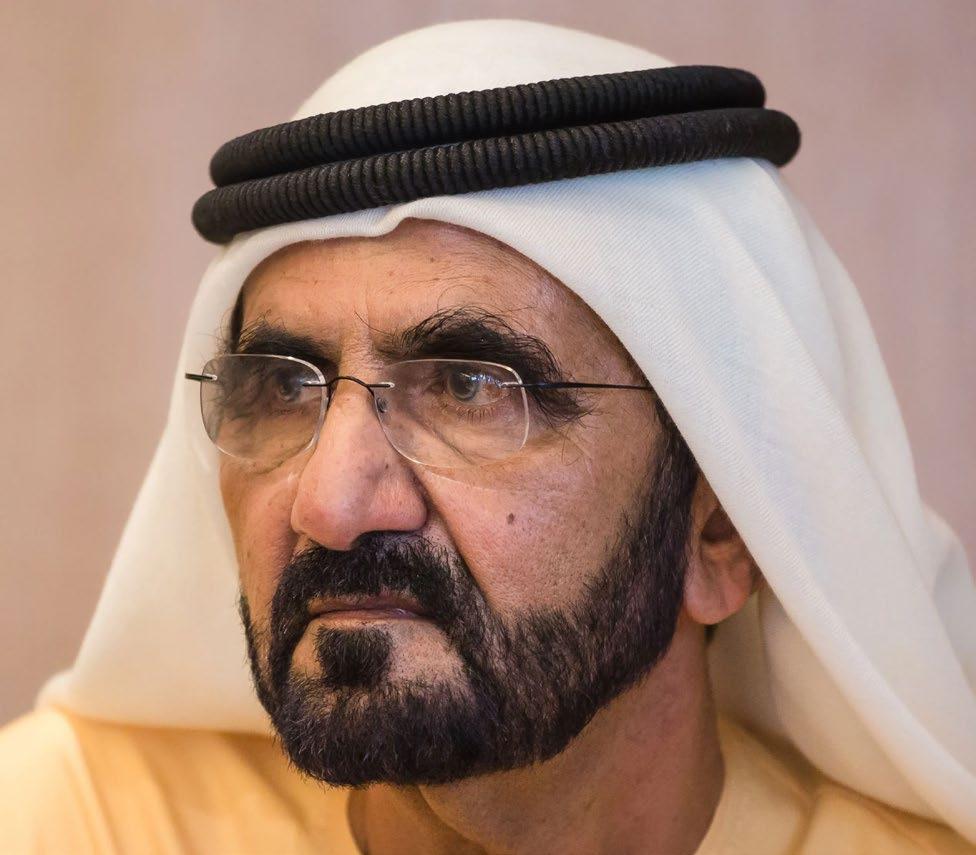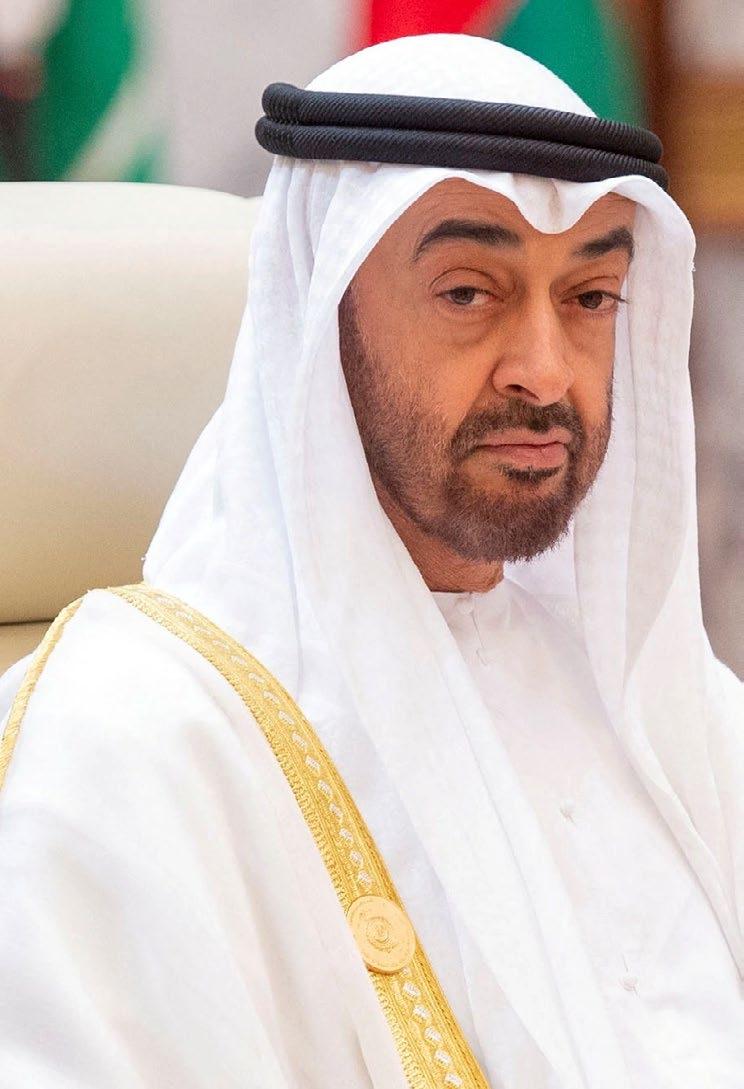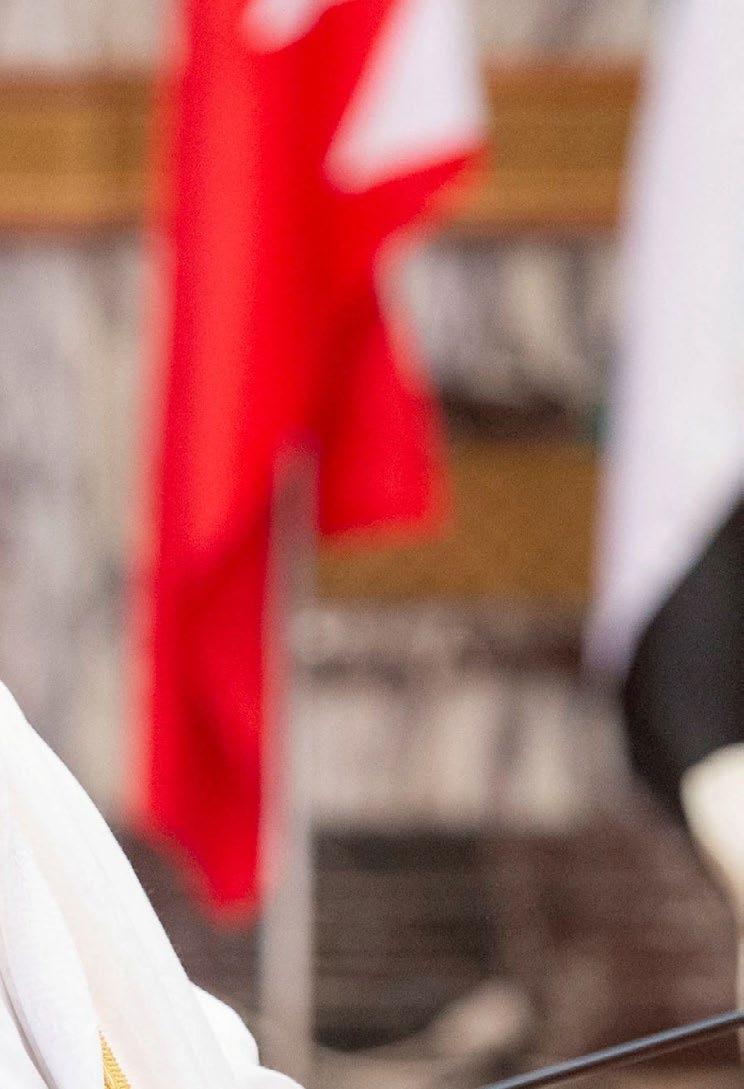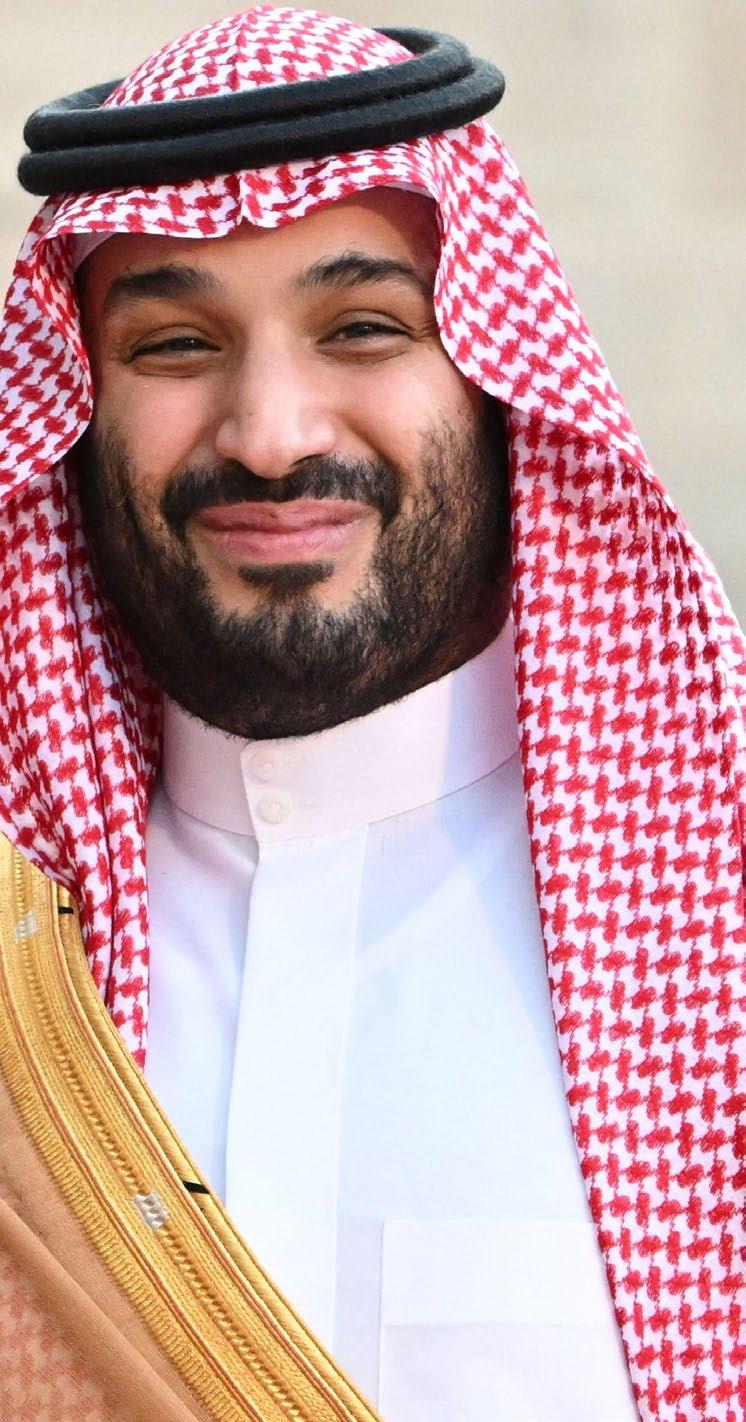
12 minute read
Sustainable States
How Middle Eastern Leaders are
Middle Eastern cities, states and regions have grown from being key cultural coordinates between east and west to being world-leading centres for economics, business, lifestyle, tourism and more in a stunningly short time. Perhaps outside the stunning rise of Beijing and Shanghai, nowhere else have we ever witnessed such vast and fast growth. And it’s not as if cities like Dubai lack behind the Chinese counterparts in terms of speed of growth with it being something of a dead-heat since the two regions began to revolutionise in the 90s.
Advertisement
What could be said of the Middle East, however, and especially Dubai, is that it’s become more of a ‘world destination’. By all means, China attracts the best and brightest and has an international demographic travelling to and from its major cities, but the Middle East has more of an openness and shared mission with its global counterparts. After all, it has now produced cities that have become part of the core lexicon of the modern cosmopolitan world – New York. Tokyo. Dubai. This is what I mean by the affiliation with major cities, Dubai rolls off the tongue with other world-leading municipalities, with Dubai and the Middle East now attracting the finest not just in business, but also fashion, sports, and social development.
With this growth comes the demand to not just adhere to present trends, but actively integrate them into the politics of a region, reshape them and find new ways to innovate and inspire global leaders. This is why sustainability is at the core of many of the latest developments in the Middle East.
Sustainability is at the core of the global conversation because it impacts every one of us. This, while symbolising the threat that climate change holds, also acts as a way to unite the world in a shared fight against a shared foe. Henceforth, there’s a win-win here for all key players in the region: we can build a better tomorrow as well as strengthen bonds and operations with other key regions, and then see the Middle East take a major role on the global stage as a bonus.
With this in mind, this piece looks at how the leaders in each of the Middle East’s major areas are operating with regard to sustainability, new business models and new governing ideologies to ensure a cleaner and greener tomorrow.
His Highness Sheikh Mohammed bin Rashid Al Maktoum, Ruler of Dubai & Vice President of the UAE
Igave Dubai a big entrance in the intro, it feels just to begin here. Sustainability isn’t exactly new on the agenda for Dubai, with Sheikh Mohammed stating back in 2012: “Environmental security is a key component of sustainable development. Our duty is to preserve the environment for future generations.” In fact, Sheikh Mohammed’s commitment dates well before that, with the launch of the inaugural Zayed Sustainability Prize in 2008.
Since then, the Prize has grown from an ambitious, UAE leadership-driven initiative that sought to encourage global action on the development of renewable energy solutions into one of the most significant and globally renowned awards for affecting positive human and sustainable impact. In its first 10 years, the Prize has added categories and expanded its reach by rewarding an ever-increasing number of visionaries, innovators and pioneers, all in the field of renewable energy.
Following the 2018 awards ceremony, the Zayed Future Energy Prize recognised the need for a strategic refocus. Understanding that the world now faces an increasingly complex and growing set of development challenges, the Prize management chose to adapt its approach so that, from the 2019 awards, sustainability solutions across multiple sectors would be recognised.
To bring us up to more recent times, Sheikh Mohammed has championed a raft of sustainable practices that has led him to describe Dubai and the UAE as “…one of the most pioneering regions in the world with regard to sustainability.”
His Highness made the comments at the beginning of Abu Dhabi Sustainability Week 2022. Highlighting the importance of ADSW, the first global gathering of its kind after COP26, Sheikh Mohammed said:
“Abu Dhabi Sustainability Week lays a pathway for COP28 when the UAE will welcome the world in 2023. The continued success of ADSW, which every year sets the sustainability agenda for the year to come, fully reflects our nation’s leadership in the field of climate action. This year’s convening of ADSW as part of Expo 2023 provides an opportunity for the convergence of global expertise to stimulate constructive dialogue and push efforts towards implementing innovative solutions,” he added.
His Highness concluded: “The UAE, guided by the vision of President His Highness Sheikh Khalifa bin Zayed Al Nahyan, was and continues to be one of the pioneering countries in the fields of climate action, energy transformation and the adoption of renewable energy as a solution for addressing environmental issues and their impact on people’s lives and the health of the planet.
“The UAE has continued to express this commitment by developing a group of the world’s largest and most innovative clean energy projects. These efforts culminated in the launch of the Net Zero by 2050 strategic initiative, which reflects our commitment to create a future free of emissions.”
Yet it isn’t just Sheikh Mohammed himself marking the pioneering efforts of the UAE, with South Korean leader President Moon Jae-in stating at the same ceremony: “The UAE is a powerhouse of sustainable development for the Middle East and beyond, with pathways showing the way for the rest of the world.”
Also, later in July 2022, Sheikh Mohammed received the Mother Teresa Memorial Award for Social Justice 2021 on the theme of Environmental Sustainability. The Harmony Foundation said it “embarked on the 17th year of the Mother Teresa Memorial Awards for Social Justice 2021 felicitating selfless individuals, leaders, youth, and organisations who have worked relentlessly in the realm of augmenting Environmental Sustainability. The Harmony Foundation has been proud to acknowledge individuals from various walks of life, from students to corporates, who are no less than the warrior-visionaries of our times and have diligently worked towards the conservation and preservation of our planet.”
His Highness Sheikh Mohammed was awarded for the UAE’s “phenomenal” long-term roadmap towards achieving environmental goals such as the Dubai Clean Energy Strategy 2050, ‘UAE Energy Strategy 2050’ (amongst many others in the UAE under his leadership and guidance).
His Royal Highness
Sheikh Mohamed bin Zayed Al Nahyan, Ruler of Abu Dhabi & President of the UAE

Sheikh Mohamed bin Zayed Al Nahyan is the figure behind the aforementioned Zayed Sustainability Prize that was launched in 2008 in commemoration of his father, Zayed bin Sultan Al Nahyan, who in turn is credited as the founding father of the formation of the UAE by uniting the seven emirates. Given this family heritage, Sheikh Mohamed bin Zayed Al Nahyan has sustainability as a central theme of his governance.
In fact, the Zayed Prize is the UAE’s pioneering global award recognizing smallto medium-size enterprises, non-profit organisations, and academic institutions for their innovative, impactful and inspirational sustainability and humanitarian solutions across the five categories of health, food, energy, water and global high schools. With 96 winners across the world, over 370 million people have been impacted by the sustainability solutions and school projects since the first awards ceremony in 2009, with this the number, continuing to rapidly grow
Delivering remarks on Sheikh Khalifa bin Zayed Al Nahyan, the previously featured Sheikh Mohammed highlighted the support, involvement and directives of the Abu Dhabi Crown Prince by saying: “The UAE continues to make important strides and contributions to advancing the global sustainability agenda to stimulate economic and human sustainable development, under the leadership of President Sheikh Khalifa bin Zayed Al Nahyan.
Adding: “Over the last 14 years, the wise and long-term vision and legacy of the UAE’s founding father, Sheikh Zayed, has ignited the passions of millions of sustainability pioneers the world over, inspiring us to take the prize to new heights by strengthening and diversifying its offerings to become the all-encompassing award it is today.”
In more practical terms, Sheikh Mohamed bin Zayed has made education a key foundation in order to achieve sustainable development in Abu Dhabi, as well as to be prepared for the post-oil era.
Abdul Rahman Mohammed Al Hammadi, Under-Secretary of the Ministry of Education for Performance Improvement, said President His Highness Sheikh Mohamed’s support for education is not limited to establishing a vision and ideas, but it also includes monitoring and conducting field visits, launching distinguished initiatives, honouring outstanding students and issuing directives aimed at advancing scientific development.
Shiekh Mohamed bin Zayed has invested Dh6 million (US$ 1.63 million) to buy books and educational material as part of the showcasing of 500,000 book titles at the Abu Dhabi International Book Fair 2021 and also looking into establishing the Mohamed bin Zayed Award for Best Gulf Cooperation Council (GCC) Teacher. The award has enlarged its scope to include 13 countries and highlights the value of teachers and the award’s mission, enabling them to perform their national duties to prepare a generation equipped with knowledge and skills.
Al Hammadi noted Sheikh Mohamed’s directives to improve the skills of students and create a motivating environment to achieve an educational renaissance, adding that the UAE is characterised by its cultural identity and traditional ethical values. Sheikh Mohamed’s vision includes promoting academic and ethical values among children and the youth, as ethics are a key elements in comprehensive development.
Al Hammadi said: “We are proud of President His Highness Sheikh Mohamed’s vision and decisions, which have boosted education at all levels as part of a future strategy, along with his keenness to establish the Institute of Applied Technology — Abu Dhabi, the Abu Dhabi Institute for Vocational Education, and the Abu Dhabi Centre for Technical and Vocational Education and Training, as well as to encourage the best universities in the world to open their branches in Abu Dhabi, such as Sorbonne University and New York University, and increase the number of students enrolled in graduate programmes.”
Sheikh Mohamed bin Zayed al Nahyan has also championed Abu Dhabi’s move away from being an oil-based economy to a modern, self-supporting and inspirational, green state. In a speech during the World Government Summit, His Highness Sheikh Mohamed bin Zayed al Nahyan had said the country would celebrate the last barrel of oil shipped out, voicing the country’s vision to move away from an oil-dependent economy.
“In 50 years, when we might have the last barrel of oil, the question is: when it is shipped abroad, will we be sad? If we are investing today in the right sectors, I can tell you we will celebrate at that moment.”
Abu Dhabi’s transformation from a little-known emirate to a global cultural and sporting destination under the leadership of Sheikh Mohamed was significant. A modern state began to emerge with new attractive real estate developments on Saadiyat Island, the building of worldclass museums like Louvre Abu Dhabi that turned the capital city into a cultural hub, establishment of higher education institutions like the New York Abu Dhabi University and leisure and entertainment destinations such as Yas Island that is home for the world’s first Ferrari-themed park.
Also, the establishment of the Barakah Nuclear Power Plant in Ruwais is an important part of the UAE’s efforts to diversify its energy sources and provide clean and efficient energy to homes, businesses and government facilities while reducing its carbon footprint. The Barakah Nuclear Energy Plant is expected to prevent up to 22 million tonnes of carbon emissions every year, equivalent to removing 4.8 million cars from the roads.
The UAE has made an ambitious climate commitment to achieve net-zero emissions by 2050. The nuclear power plant will play a huge role in decarbonising the electricity supply to meet the target. The UAE will host the climate change summit COP28 in 2023, which is seen as a milestone in the country’s efforts to address and accelerate climate change issues.
“The UAE is honoured to have been selected as the host country for COP28 in 2023. We look forward to working with the international community to accelerate global efforts to address climate change & environmental protection and create a more sustainable economic future,” His Highness Sheikh Mohamed bin Zayed Al Nahyan recently stated. In 2021, he announced the launch of a global clean energy powerhouse intended to spearhead the drive to net-zero carbon

His Royal Highness
Mohammed bin Salman al Saud, Crown Prince and Prime Minister of Saudi Arabia
While it is Mohammed bin Salman’s father, King Salman bin Abdulaziz Al Saud, who is the leader of Saudi Arabia, it is his son – the Crown Prince and Prime Minister – that is making waves with regard to social, economic and environmental change in the Kingdom. This may be a strategy, as Mohammed bin Salman (colloquially known as MBS) is naturally a much younger man whose destiny is to lead Saudi Arabia into a new epoch.
When observing the speeches, policies and goals of MBS, one can see the essence of a man rooted in his country’s traditions, with an understanding of global affairs, social change and cultural zeitgeist. This has led many in the global media to refer to Mohammed bin Salman as something of a relative ‘progressive’ who, according to Time magazine, is aiming to ‘transform’ the Middle East.
The centrepiece of the ongoing transformation in Saudi Arabia is of course Vision 2030, a strategic framework which aims at reducing Saudi Arabia’s dependence on oil, diversify its economy, and develop public service sectors such as health, education, infrastructure, recreation, and tourism. The key goals include reinforcing economic and investment activities, increasing non-oil international trade, and promoting a softer and more secular image of the Kingdom.
Sustainability has also been at the heart of Vision 2030 since its inception. Saudi Arabia is now ushering in a new era as the Kingdom aims to reach Net Zero by 2060. This announcement is in line with wider Vision 2030 ambitions to accelerate the energy transition, achieve sustainability goals, and drive a new wave of investment.
Mohammed bin Salman said of the aims: “Climate action will enhance competitiveness, spark innovation, and create millions of high-quality jobs. Young people, both in the Kingdom and the world, are demanding a cleaner, greener and more inclusive future, and we owe it to them to deliver on this.”
These words have been buttressed by the launch of the ‘Saudi Green Initiative’ which targets to implement the aforementioned aims as well as hit some key markers such as reducing carbon emissions by 278 mtpa, by 2030, planting 10 billion (yes, billion) trees across Saudi Arabia and to protect an extra 30% of land and sea space.
Further, Saudi Arabia’s capital Riyadh is also transforming in an attempt to reduce the effects of climate change as a part of the Saudi Green Initiative. The Kingdom aims to plant 10 billion trees as mentioned above, and Riyadh and its surroundings will will, according to Dr Osama Ghanem Al-Obaidy, Adviser and Professor of Law at the Institute of Public Administration, be the site of 7.5 million of those..
Al-Obaidy told Arab News: “This project is one of the most ambitious tree-planting projects ever undertaken worldwide. The (7.5 million) trees (around Riyadh) will be selected from those compatible with Riyadh’s weather and environment. New irrigation networks will be established to use recycled water. This will raise the quantity of recycled water being used across the city.”
He added that the project will help improving and promoting Riyadh’s image as an environmentally friendly metropolis, and that it will reduce the capital’s energy consumption and ultimately cut down health-care expenditure by promotinghealthier lifestyles for its residents.
Ultimately, the goal is to ‘green’ the capital enough to lower its ambient temperature by 2 degrees Celsius (3.6 degrees Fahrenheit), giving the city a cushion against climate change in a region where summer temperatures exceeding 110 degrees Fahrenheit are already common. Finally, the projected zero-carbon city of NEOM being built in Saudi Arabia that will have vertical layers of buildings for work, living and leisure stretching for 170 kms over a futuristic landscape, the Kingdom’s Crown Prince has declared. Unveiling ‘THE LINE’, a primary feature of the US$500bn project, Prince Mohammed bin Salman announced that the flagship development will be partly financed through a public listing in the country’s stock exchange in two years’ time, and would be subject to its own autonomous legal system.
He added: “THE LINE is an affirmation of our firm commitment to presenting a project to the whole world. NEOM is a place for those who dream of a better tomorrow. We cannot ignore the liveability and environmental crises facing our world’s cities, and NEOM is at the forefront of delivering new and imaginative solutions to address these issues.’
“The city’s vertically layered communities will challenge the traditional flat, horizontal cities. The designs of The Line embody how urban communities will be in the future in an environment free from roads, cars and emissions.”
Whichever way we look at it, it seems Saudi Arabia and Crown Prince Mohammed bin Salman have an exciting future planned, perhaps one of – if not the –most exciting in the world. The developments here may well influence how the whole world follows.











